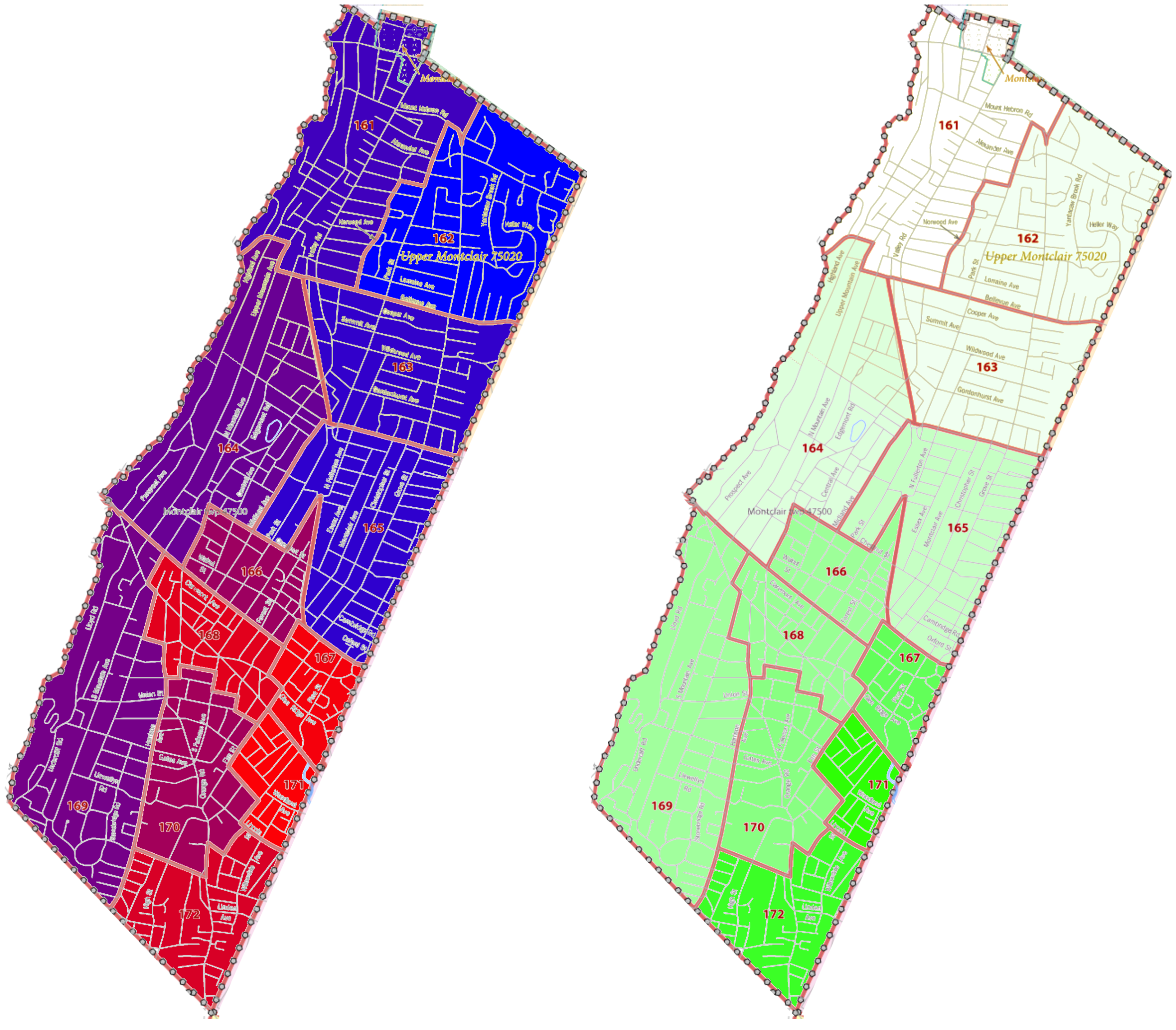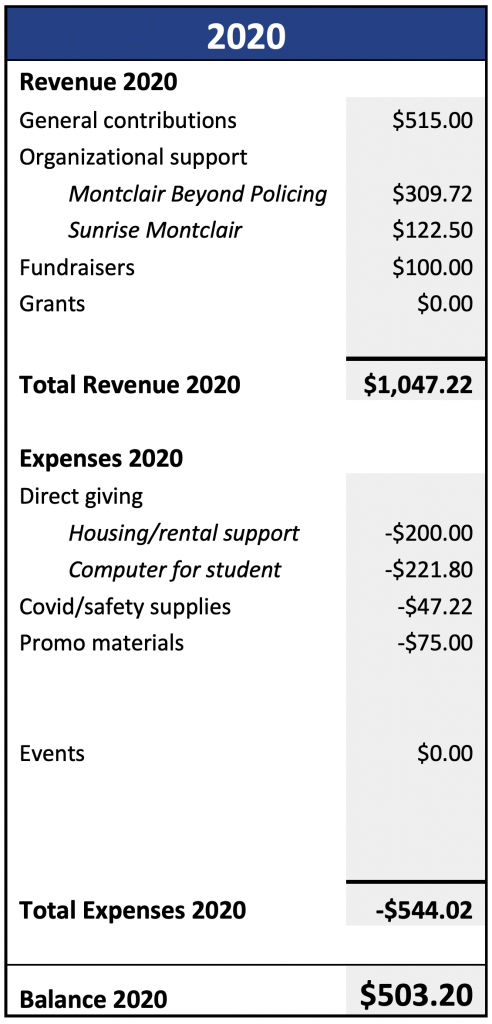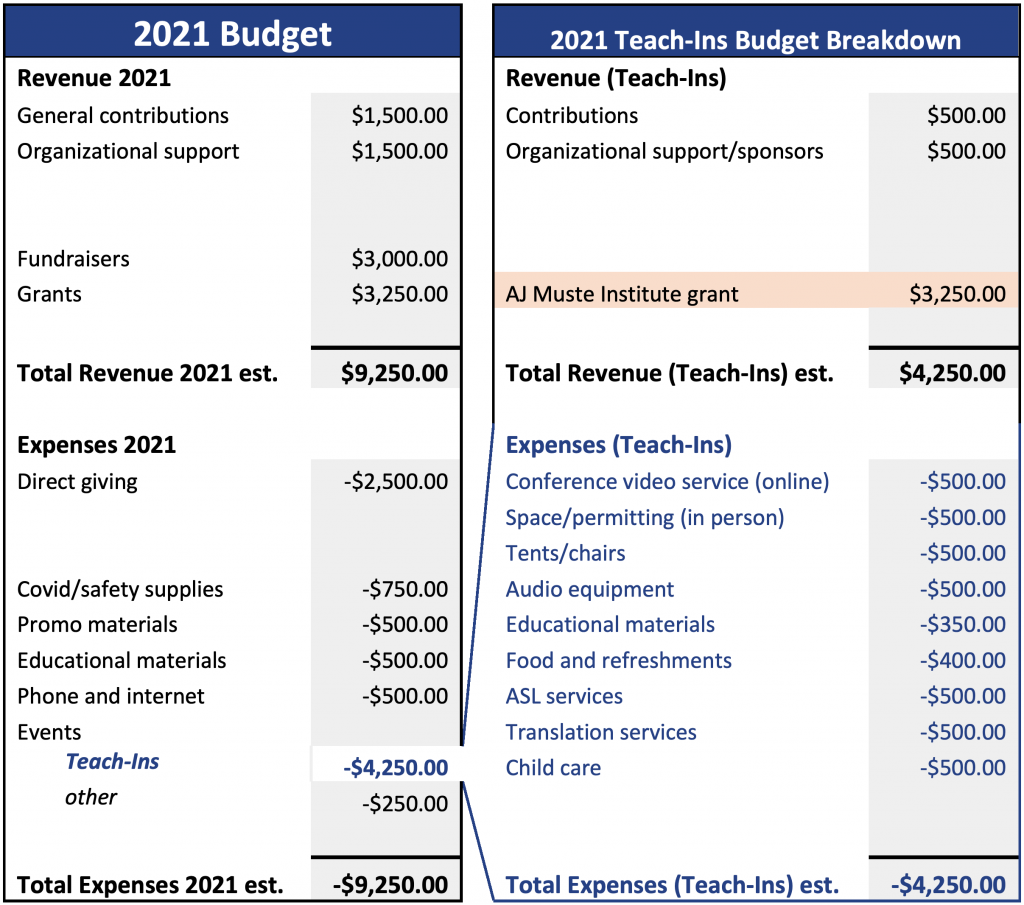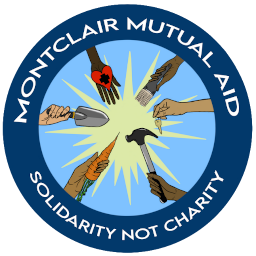MtcMA grant proposal submitted to the AJ Muste Institute
Activating people to solve community problems via mutual aid relationships
Expanded text of grant proposal submitted to the AJ Muste Memorial Institute:
download 8-page PDF document.
Summary
Montclair Mutual Aid seeks to build community strength by fostering networks of people who can rely on one another for assistance and support. We help people learn how to work together, without traditional government and charity power structures.
We are creating a community Teach-In Series to bring concepts and examples of mutual aid directly to struggling individuals and families in our area. The series is designed to spark mutual aid actions toward reducing systemic poverty, while empowering marginalized community members to exert greater agency and feel greater dignity in their lives.
Grant funds from the AJ Muste Institute will cover event expenses of live sign language, professional recording, language translation, childcare, and direct outreach – making the series more accessible, available, and actionable to members of marginalized communities.
Target audience: People of Montclair’s 4th Ward and other marginalized neighborhoods
The town of Montclair, New Jersey shows unusual contrasts and stresses. Having benefited over 150 years from an attractively short train commute to New York City, Montclair has amassed pockets of wealth, both old and new. Yet other sections of Montclair, sown and grown from economic and racial segregation, show persistent and severe effects of poverty, inequality, and marginalization.
Our Teach-In Series will serve the people of Montclair’s 4th Ward community, certain parts of the 3rd Ward, and beyond. This area of Montclair is a historically working-class and marginalized section, populated during the town’s initial development by servant economic classes, and evolving over the past 50 years to house a predominantly (in some areas up to 90%) racial minority population.

US Census tracts 2020 data.
Even today, the 4th Ward is perceived as receiving inferior treatment from town government and from the at-large population of Montclair. In this area, resources and services are unevenly distributed, public transportation is lacking, water quality is poor, housing upkeep lags, and substantial school achievement gaps exist. Moreover, some parts of this area are increasingly subject to gentrification pressures, leading to fast-increasing home rental costs as well as generally diminishing maintenance of lower-rent properties.
Despite these persistent issues, Montclair has many community members who have worked energetically and caringly to improve the quality of life here. Montclair pioneered a largely successful, progressive solution to the nationwide public school integration crises of the 1960s and 1970s. The magnet school system developed and implemented in Montclair defused tensions over school busing, and led to significant gains in education equity. Montclair’s magnet school system still thrives, and has become one of the core, defining features that binds the town together emotionally and distinguishes it from other New Jersey towns.
Montclair’s relative progress in integrating its public schools has, more broadly, spawned an environment that uniquely encourages diversity. Montclair has become known as a town that accepts difference and nonconformity. In turn, Montclair has evolved to become a cultural hub in the region, with festivals of music, art, film, design, literature, cuisine, and more.
About Montclair Mutual Aid
Montclair Mutual Aid was founded in March 2020, responding to pandemic emergency needs, but aiming to establish itself permanently. During its first year, Montclair Mutual Aid has grown to include hundreds of volunteers and thousands of benefited residents. Participants come not only from Montclair itself but also from the adjacent NJ towns of Bloomfield, Glen Ridge, Clifton, Little Falls, Cedar Grove, Verona, and West Orange.
During its first year, Montclair Mutual Aid volunteers have organized and run a variety of aid activities and collaborations, including:
- Food distribution with Montclair Moms of Color
- Toiletries drive and distribution
- Free books and ice cream distribution
- Weekly community food gardening, harvesting, and distribution
- Installation/operation of 7 free food pantry kiosks, with NE Earth Coalition & other groups
- Weekly free food deliveries to seniors and other residents for Toni’s Kitchen
- Community free monthly food distribution events with live music performances, with Parents Who Rock and Toni’s Kitchen
- Art auction fundraiser
- Collect and distribute free air conditioners during hot weather
- Free furniture distribution events
- International Women’s Day collection/distribution event for menstrual products
- Collection, placement, and ongoing replenishment of free menstrual product baskets, with Montclair Menstrual Club
- Science equipment drive for kids in Montclair’s 4th Ward, with Project Oasis
- Senior home yard clean up
- Holiday gift drive and distribution
- Clean water bottling and distribution, with Newark Water Coalition
- Direct giving of emergency cash for rent, utility bills, diapers, personal items, with donations from Montclair Quaker Meeting, Montclair Beyond Policing, Sunrise Montclair, and St Cassian Girl Scouts
- Publicity for crowdfunding of individual and family needs
- Seniors list for free food delivery in the 4th Ward, with Montclair YMCA
- Free pickup/shopping/delivery service for seniors and others who can’t get out
- Local shuttle planning to improve grocery/shopping access for 4th Ward food desert
- Employment mutual aid support/discussion group
- Research and create a resource website for critical needs (montclairmutualaid.org)
The mission of Montclair Mutual Aid is to foster an ongoing network of people and groups in Montclair to help one another meet critical needs.
Montclair Mutual Aid operates as a non-hierarchical, consensus-governed organization. We hold semimonthly general meetings and are organized as a collection of semi-autonomous affinity groups on specific projects.
We do not categorize participants as “givers” or “receivers” of aid: all community members are included, giving what they can and taking what they need. Montclair Mutual Aid participants and volunteers are multi‑diverse, from all neighborhoods of Montclair and adjacent towns, of all ages and genders and orientations, from many races and ethnicities, at all economic levels, with all educational backgrounds.
Community Teach-In Series
Our teach-ins will aim directly at community members of Montclair’s 4th Ward, parts of the 3rd Ward, and similar neighboring areas. We are planning a series of topics of interest to those communities. The series will run in 5 half-day sessions, once a month over 5 months: August through December 2021. The events may have virtual and/or in-person components.
The teach-in topics are intended not just to provide information, but to help people start engaging in mutual aid actions to address ongoing local issues, like these:
- The 4th Ward is a food desert. It has not had a grocery store since 2013.
Can neighbors help one another by organizing transportation to grocery stores, creating a coop store, or sharing info on how to extend resources and avoid waste?
- Housing is becoming less affordable and scarcer in the 4th Ward. Long-time residents are being driven out by cost.
Can neighbors help one another by organizing against evictions? Can residents create a mediation/negotiation service to bring a tenant, landlord, mortgage bank, and town tax officials to agreement together at the same table?
- Jobs are less secure. Safety net programs are weakened and unreliable. Labor protections are diminished. Many people are out of work.
Can residents assist one another with job-seeking skills or job opportunity referrals? Can neighbors create work opportunities for one another, as a local cooperative services exchange?
- Surviving the pandemic is tough. Stresses are overwhelming. Tensions are high, and disputes escalate. Unhealthy behaviors tempt. Children suffer and act out.
Can neighbors cooperatively reduce stress? Are there fun and inspiring, but safe, activities that families can do? Can creative tasks build children’s resilience? Can neighbors help seniors or people with disabilities who can’t go out? Can the community establish a collection and distribution point for free food?
- It’s expensive to be poor. Costs and problems compound. For lack of a few dollars, a taillight wasn’t replaced, leading to a traffic fine, leading to inability to make a car payment, leading to losing the car and being forced to take the bus, leading to lateness at work, leading to losing a job, leading to rent nonpayment, leading to eviction, etc.
Can neighbors create a cooperative emergency fund for small emergency expenses, to forestall a chain of worsening consequences? Can neighbors pool purchases to get a discount? Can neighbors organize to share tools or cars or rides or childcare, reducing individual outlays?
As with all mutual aid efforts, the focus of our Teach-In series is not to solve people’s problems for them, nor to give them charity aid – but rather to help empower them to solve their own problems by working together. A key component of our Teach-In series will be to help people in Montclair’s marginalized communities build ongoing relationships with one another, so that they can sustain their own community-power projects.
Toward that end, each of our Teach-In events in the series will include several organizing steps:
- free community attractions, such as live music performances, children’s art table, playground, and food/clothing drive distribution;
- activities or exercises that encourage participants to learn one another’s names, and to collaborate on achieving a small shared goal;
- collecting and distributing contact information so that willing participants can find one another for future actions;
- interactive presentation with an invited speaker or topic expert, to stimulate thinking and excite interest;
- directed brainstorming, in which each participant is encouraged to share ideas on community needs and possible solutions, in a supportive, respectful, positive environment;
- visioning, in which participants can imagine and discuss outcomes and benefits of solving a shared problem;
- planning of next steps and scheduling a next meeting;
- volunteering to perform next steps, and to convene the next meeting.
For example, a Teach-In on food insecurity in Montclair may include:
- Adjacent location to our existing monthly free community food distribution + live music performance series in a 4th Ward park.
- Playing a round of Co-opoly (“the game where everyone wins, or everyone loses”) or Stardew Valley (“work together to grow crops, raise animals, expand the farm, and befriend local villagers”).
- Talking with an expert on starting and running food coops.
- Brainstorming and envisioning how a 4th Ward food coop might work, where it could be located, how people would participate, and what benefits would result.
- Volunteering to talk with a town council person about starting a food coop, and to publicize a next meeting for interested residents.
Besides each focusing on a specific topic, all 5 of the Teach-In events will share some common threads:
- Building awareness that you’re not alone. Many Montclair neighbors have the same problems, for the same reasons.
- Building awareness that community members can work together. It’s easier to get problems solved as a group than individually.
- Organizing to exercise community power. Helping inform and empower people to get what they need – by educating about both how to approach/confront local government and how to bypass government through direct action by community members.
- Pay it forward. Participants will be encouraged to reteach in their neighborhood, or to teach something else based on their own skills.
- Poverty amid wealth. Helping local residents see that many here struggle, while others have comfort and luxury. Unhiding the needs in Montclair. Making poverty harder to ignore.
- Antiracism and anti-inequality. Helping people overcome microaggressions and disrespect, etc. Helping people learn how not to (unconsciously or unintentionally) insult, troll, trigger, or disdain.
Budget items for the community Teach-In Series
Ordinary expenses paid by Montclair Mutual Aid for the series may include:
- publicity,
- park venue permits,
- masks for attendee protection,
- rental of chairs and tables,
- audio equipment rental.
Additional expenses, to be covered by the requested grant funds, would increase the attraction and extend the reach of the Teach-In Series materials, to more community members locally and to more communities in the US and worldwide. These expenses include:
- professional videography,
- live ASL signing,
- language translation,
- online conference video service so more people may participate remotely,
- childcare so parents can attend,
- fees/honoraria/travel for outside speakers/experts,
- light refreshments to attract/retain more participants,
- tent rental for weather protection.
Evaluating and reporting outcomes of the Teach-In Series organizing
With grant funding, we will be able to create and publish professional video recordings of key parts of the Teach-Ins. This will serve as an ongoing guide, reference, and inspiration for other groups interested in activating their community members in mutual aid. We will seek press and social media publicity not only to attract participants to our Teach-Ins, but also to encourage others to organize similar mutual aid activities in their communities.
We will record and document the number of participants in each of our Teach-Ins, and the nature of their participation. We will seek to build additional connections of our own among the participants, and to stay in touch with them through any continuing actions that they organize. We will document such activities during the year following the Teach-Ins. If at least two or three of the Teach-In events spark further, organic, ongoing, mutual aid activity in the Montclair area, we’ll be thrilled with that success.
Impact of Muste grant funding
Our Teach-In Series represents an opportunity to bring the power of mutual aid organizing directly into marginalized communities – in particular, Montclair’s 4th Ward, lower-income parts of the 3rd Ward, and similar neighborhoods – where community members may become further motivated to band together, for the purpose of overcoming problems related to poverty and discrimination.
Montclair is a particularly promising place to hold a mutual aid Teach-In Series like this. Having a strong history of progressive activism, mixed with the steep contrasts between wealthy and struggling neighborhoods, Montclair contains necessary ingredients for success of the series: people with deep ties to one another, a sense of community history and belonging, a set of thoughtful and caring residents, a cadre of energetic and experienced activists, some persistent and serious problems of marginalization and discrimination, and – despite the serious problems – some vitality and genuine hope for better lives.
Our community Teach-In Series will let us learn and teach new methods for activating and empowering people. The Muste grant will help make insights from those methods available and accessible to a wider audience, through professional videography, language translation, ASL signing, parent participation, and topic experts.
Montclair Mutual Aid participants
Several Montclair Mutual Aid volunteers helped create this proposal.
- Lisa Conforti, a Cedar Grove resident, organizes free food distribution efforts with Montclair Mutual Aid and assists the NE Earth Coalition with its Free Pantry project and community gardens.
- Phoenix Herring, an artist who has lived in the 4th Ward of Montclair for 15 years, co‑leads direct aid and free menstrual products distribution for Montclair Mutual Aid.
- Danielle Iwata, a dancer and arts administrator living in Montclair, helps Montclair Mutual Aid with communications, fundraising, arts & culture, and antiracism organizing.
- Susie Román Luna, a resident of Clifton and catering business owner, is committed to dignity, justice, equity, and compassion, and helps organize distributions with Montclair Mutual Aid.
- Jonathan Marshall, a computer scientist dedicated to social justice, has organized and run conferences and speaker series, has lived in Montclair 12 years, has co-led a variety of community-bonding activism projects, and now focuses on further strengthening of Montclair Mutual Aid’s capacity and structure.
- Char O’Dair-Gadler is an artist and writer who grew up in Montclair. They are part of several Montclair Mutual Aid initiatives, including fundraising and direct aid.
- Greg Pason, a political organizer and activist who has lived in Montclair for 13 years, has created many events and groups, especially in music performance for community solidarity, and co-leads several Montclair Mutual Aid projects, including community food gardening.
- Priscilla Perez is an activist on consumer waste reclamation and product salvage who distributes food and other items with Montclair Mutual Aid and lives in the 4th Ward.
- Aminah Toler is a lifelong Montclair resident who lives in the 4th Ward. She aims to ensure that 4th Ward residents aren’t forgotten or underserved. She is an active member of Montclair Moms of Color, and serves as a township Community Health Worker and as an admin for local social media pages. She co‑leads several Montclair Mutual Aid initiatives, including free food and water distribution.
Montclair Mutual Aid funding and project budget
Montclair Mutual aid requests a grant from the AJ Muste Memorial Institute to fund our community Teach-In Series, in the amount of $3,250.


